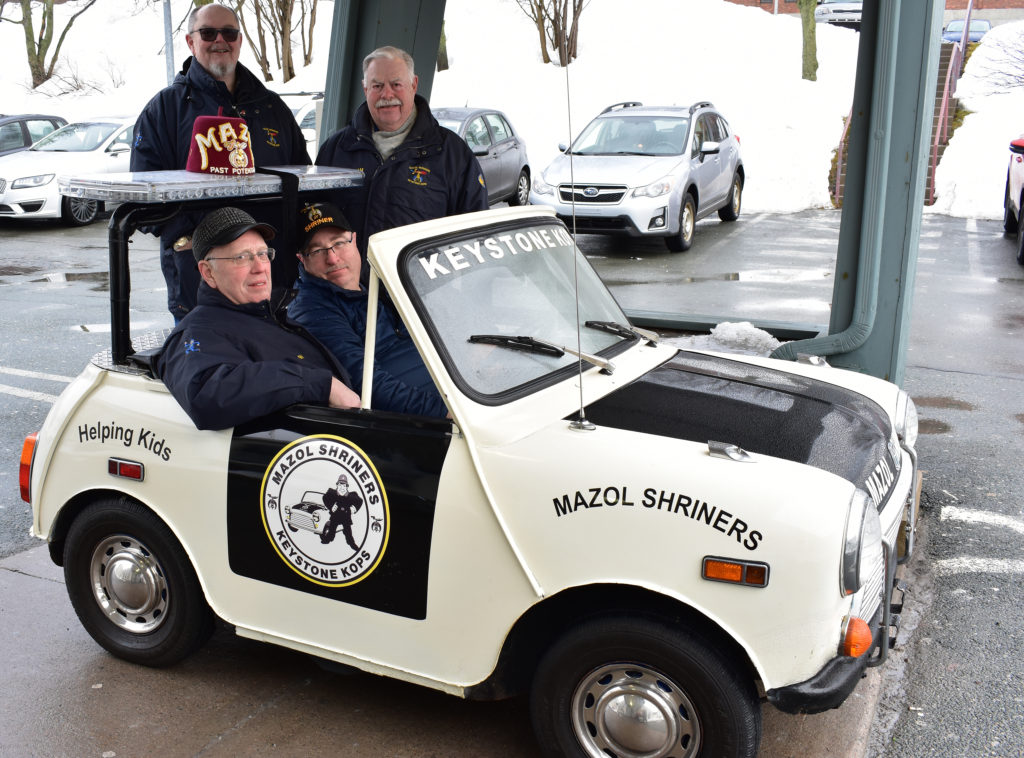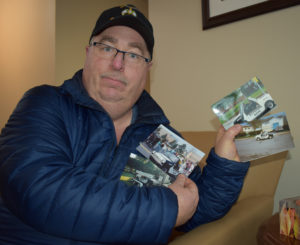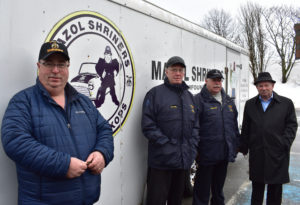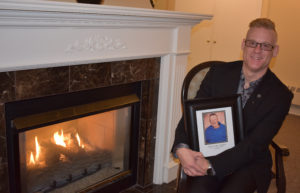The late Hubert Morley Locke’s famous “double-ended” Keystone Kop car helped him entertain children while he was a Shriner.

Melissa Wong
Kicker
The tiny 1976 Keystone Kop car used by the Shriner’s in parades and celebrations now sat parked outside Carnell’s Funeral Home.
That Kop car was one of the Shriner cars that Hubert Morley Locke repaired over the years.
Locke was a Mazol Shriner for more than 35 years and was a member of Masonic Lodge for much longer. Locke worked as a teacher. Later in his career, he had a supervisory role in the Newfoundland education system until he retired.

According to the Shriner noble David Pike, Locke was the mechanic for the Shriner’s three Keystone Kop cars. Locke could fix the cars that no one else could, said Pike.
Locke was most famous for his role in building a Keystone Kop Kar that was “double-ended” – so called because it had two front-ends.
In the 1980s, Locke and Roy Moore, a Shriner from Brigus Junction, built their most famous car together. The two took the front ends of their 1969 mini-car and their 1971 mini-car to create the double-ended Kop Kar, which was driven in many Santa Claus parades.
“I was never allowed to drive it,” Shriner Lorne Warren said. “You had to be very experienced because when you are going one direction, the driver facing forward was driving it. Then, they used to switch control to the other driver and then he would drive it almost in reverse but looking ahead. One or two people had the talent to do it.”
After Locke and Moore made the double-ended car, Shriner Jim Finch bought a 1976 mini-car. He donated it to the Shriner’s Keystone Kops to become one of their Kop Kars.
Finch donated the mini-car because he was proud of what Locke did with the double-ended car. During parades, he wanted to drive the 1976 mini-car behind Locke and his double-ended car.
Finch said all the kids love the double-ended Kop Kar. The kids would line up on both sides of the street to watch Locke perform a figure-eights and other stunts.
“The kids loved to watch their stunts,” Finch said.
The funeral
Locke died on Tuesday, Jan. 8. He was 80.
“Uncle Hubert’s passion, gentle spirit, his humor [and] love for life won’t be forgotten,” said Grant Janes-Locke.
The Locke family asked the Mazol Shriners to bring the double-ended car to his funeral.
The Shiners could not honour the family’s request. Locke had retired the double-ended car and placed it in storage.
“We are still hoping and trying and thinking about trying to put it back together, but Hubert asked us about two or three years ago not to put it in the parade anymore,” Warren said. “He was a little concerned about the safety and he didn’t want it to turn out to be a bad situation happening during a parade or something.”

The Shriners took their other two Keystone Kop Kars to Locke’s funeral.
The two working cars, stored in the Mazol Shriners Keystone Kops trailer, were transported to the funeral home. The Shriners put the ’76 mini-car on display outside during the visitation. The other car stayed in the trailer.
The double-ended car’s legacy
The Keystone Kops were silent film slapstick characters who became comedic American folk art creations as incompetent cops. Shriners dress up as these characters to promote themselves, support their communities and help children.
Over the last 30 years, the famous double-ended car has been in many Newfoundland parades.
“There is always a big interest in getting the Shriners cars and Keystone Kops on parade because of the kids,” said Allan Neil. “Everybody knows what Shriners do for kids and we can entertain kids and keep them happy with a few smiles on their faces.”
According to Neil, the Shriner Kop Kars have been in parades in St. John’s, Mount Pearl, Bell Island, Portugal Cove, St. Philip’s and Bay Roberts. The cars have traveled from central Newfoundland to Corner Brook.
“We’ve been in most places,” Neil said. “We haven’t been to Labrador.”

In the next parade, said Janes-Locke, someone in the family would like to drive or be a passenger in Locke’s honour. They made the offer, and the Shriners are giving the offer some thought.
According to Janes-Locke, his uncle had a “heartfelt” commitment, a heart of giving, a national vision. He made trips to a hospital in Montreal and other areas throughout Canada for sick children.”
If the Shriners cannot fix the double-ended car, said Pike, then it will go to a Shriners Hospital for Children.
Standing next to the ’76 mini-car, Finch said, “He will be missed terribly by the Keystone Kops because of his ability to solve a problem and make us laugh.”
